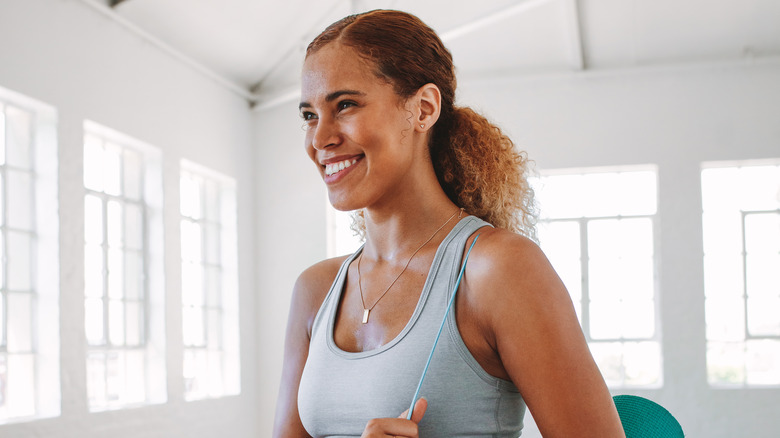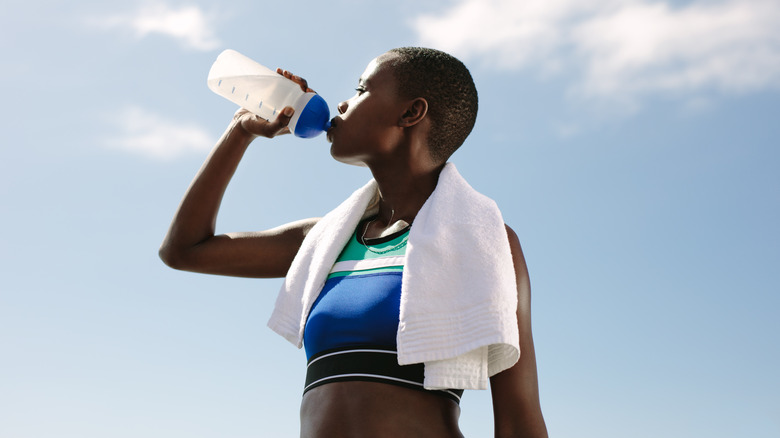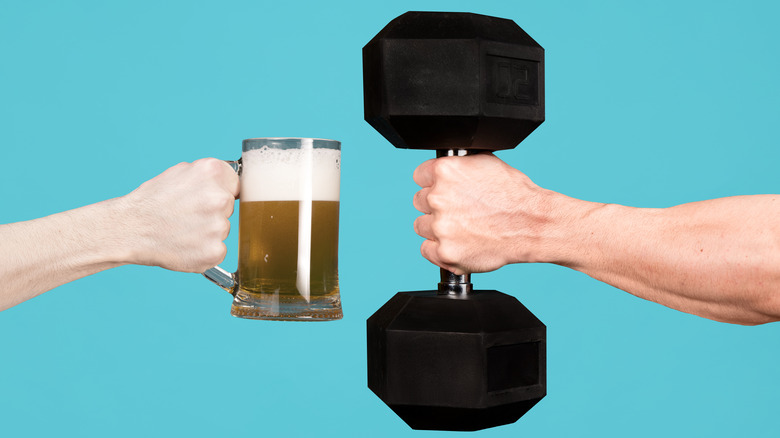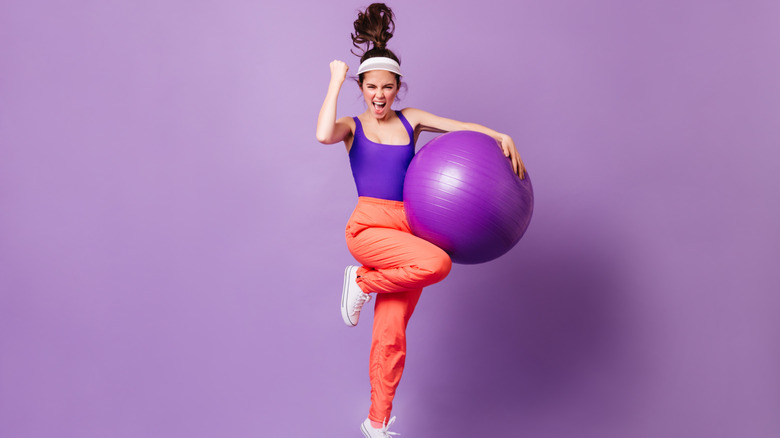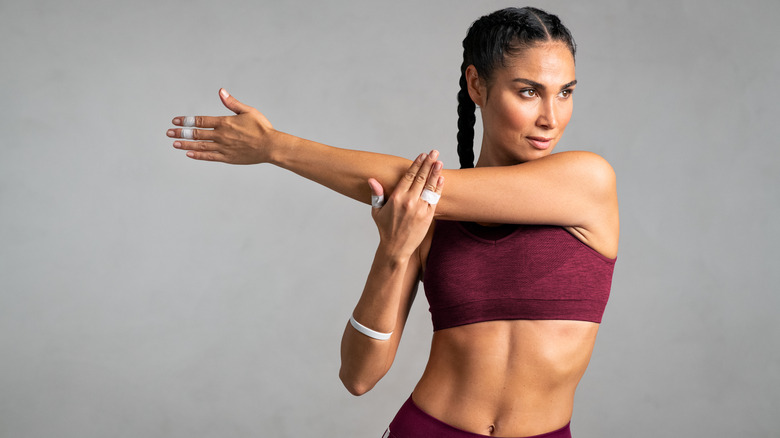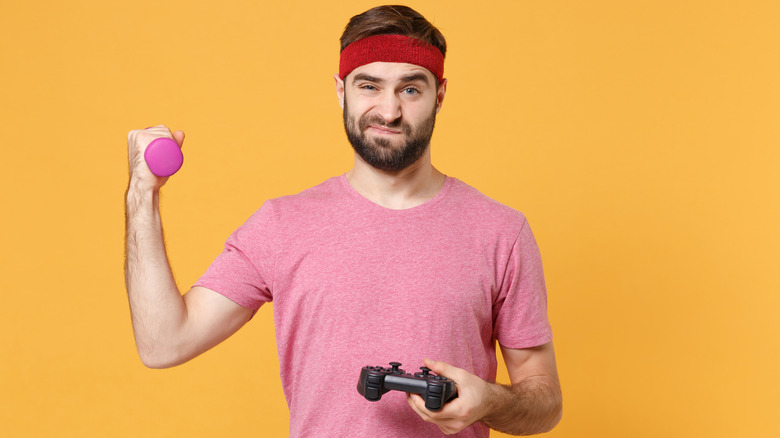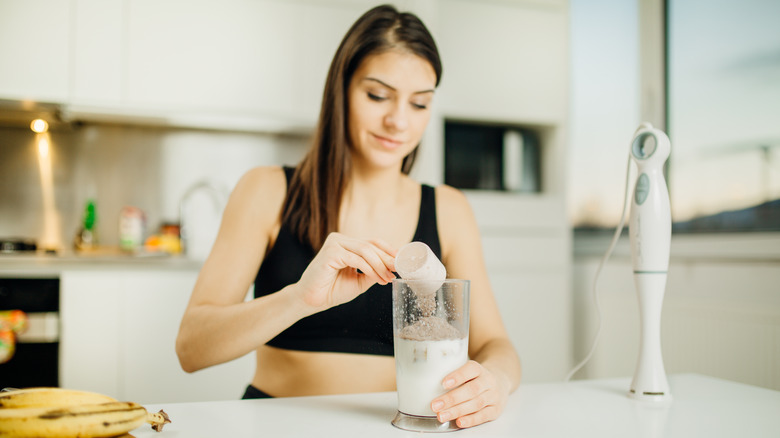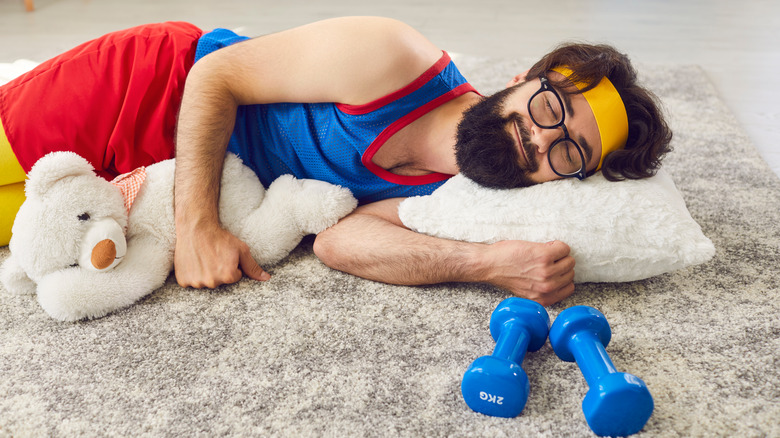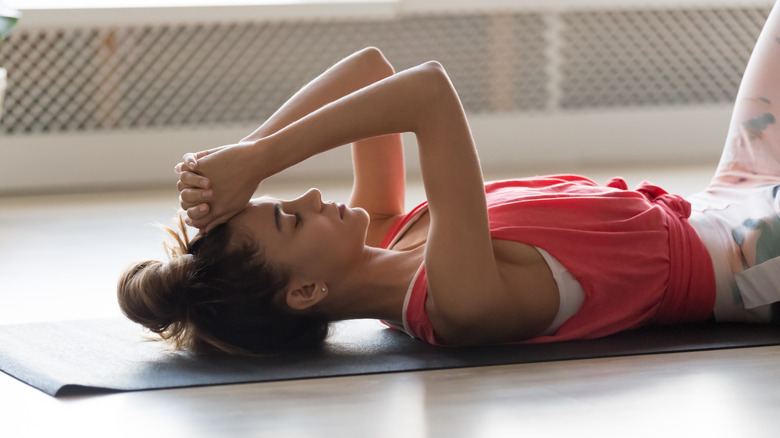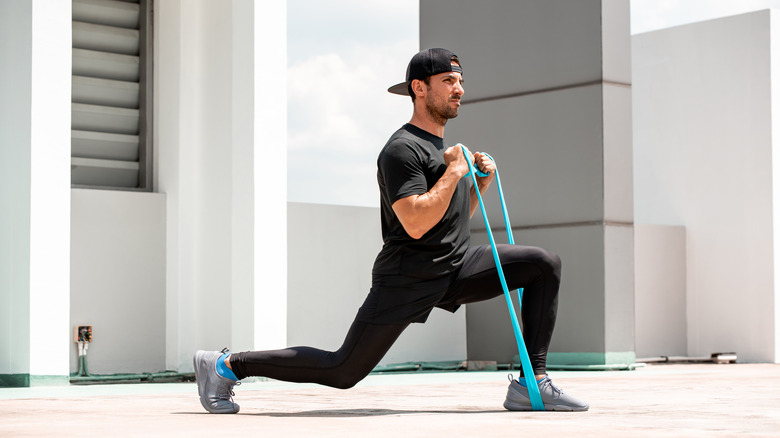Things You Should Never Do Before A Workout
From your trainer to your best friend to that rando at the gym, everyone seems to give out (often unsolicited) workout tips. As we're sure you've noticed, some of that advice is better than others. Maybe you've received some truly great guidance, or perhaps you've been fed workout myths.
This got us thinking. Instead of focusing on what to do at the gym, we decided to explore what not to do before you even start working out. Should you have that brunch mimosa before hitting the gym? Should you really stretch or pre-treat with ibuprofen? We dug into the details of what not to do before you work out because, as Sam Stauffer, director of training at Spartan Race, Inc., explained to Bustle, "You'll want to do the right things before a workout and avoid all the wrong ones." Here's a look at what you should steer clear of just before your next sweat sesh.
Eat a big meal
Do not eat a big meal before your workout! If you have ever gone to town on a Big Mac right before a workout, you know this rule to be true. When you eat a heavy meal, blood is routed to the gastrointestinal tract to help digest the food. If you start a workout while this process is underway, you are likely to feel sluggish, heavy, and unmotivated (via OrthoVirginia). Whenever possible, experts recommend waiting two hours after eating before working out. This lag time allows digestion to occur, which supplies glycogen to your muscles.
Replenished muscle glycogen stores are crucial for a solid workout. Because of this need, experts recommend specific foods if you feel the need to munch right before working out. That's right, a Big Mac is not exactly the best pre-workout fuel. If you aren't able to eat a healthy meal two hours before your workout, OrthoVirginia recommends at least eating a piece of fruit, like an apple or a banana, five to 10 minutes before you start exercising.
Drink a ton of water
Drinking plenty of water is important for overall health and, of course, to have great workouts. However, chugging a ton of water just before you exercise is a definite no-no. Hyponatremia is a condition caused by over-consumption of water (via WebMD). Too much H20 in your system can lead to low levels of electrolytes, which ultimately inhibits your cells' ability to function properly.
While this condition is not super common, it does occur in endurance athletes who try too hard to over-hydrate before a grueling workout. A lack of sodium and other electrolytes (magnesium, potassium, calcium) can lead to nausea, vomiting, muscles cramps, spasms, fatigue, and headaches. Over-hydration can even land athletes into comas in extreme cases, according to WebMD.
On a broader, more accessible note, drinking too much water can cause you to become bloated (via Livestrong). This can cause general discomfort once you start to move your body during exercise. As TMI as it may seem, exercise scientists recommend monitoring the color of your urine. The ideal urine color is "light straw," according to the Cleveland Clinic. The more you know...
Drink alcohol
It is enticing to think about a happy hour turning into a gym session. Sometimes the spicy margs look so good that we just want to handle them like Patrick Swayze cradles Demi Moore in "Ghost." However, we did a bit of digging to discover if kicking one (or two or three) back before getting sweaty is a good idea.
Across the board, Healthline experts agree that it is never advisable to imbibe before working out. A few sips of alcohol can ignite physiological changes in your body, including but not limited to decreases in coordination, inhibitions, and GI issues. Since even one drink affects your brain chemistry, balance becomes a huge concern. You are far more likely to misjudge a weight or movement while under the influence of alcohol.
Another huge concern is dehydration (via Healthline). Since your favorite spirit is a diuretic, it can have a dehydrating effect when combined with sweating. Many people walk around slightly dehydrated as it is, so contributing to that might be a setup for a workout disaster. We are all for you living your best, most balanced life. And as such, we recommend hitting the gym before the bar. When that isn't an option, skip the workout and watch "Ghost." All research proves that you will be more rested and able to reap the benefits of your workout if you wait and show up sober.
Fast
Fasting comes and goes in popularity. While you shouldn't eat a big meal right before working out, the opposite is also true. Intermittent fasting does have its benefits, and we are not here to argue those facts. However, going into a blood-pumping workout fasted can have negative repercussions.
Your muscles function most optimally when you give them a bit of fuel, preferably in the form of carbohydrates. Pre-workout this can mean a piece of fruit or something comparable. For example, one banana has about 27 grams of carbohydrates. For your cells to function at full capacity during a workout, they need a small amount of glucose, which is what your small pre-workout snack turns into on a cellular level (via Healthline).
Failure to provide your body with a snack before you sweat can lead to sluggishness, fatigue, or feeling faint, Self explained. If you want to be at your best when you hit the gym, heed experts' recommendation to eat a small snack about an hour or two before you sweat. Your body will thank you!
Engage in ballistic stretching
Ballistic stretching went out of style with Jazzercise, and we have often wondered why. It turns out, ballistic stretching is straight-up bad for most people. We can be thankful that this style of stretching fell by the wayside along with spandex leotards and the like.
Ballistic stretching can be identified by its bouncy, jerky movements. Not to be confused with dynamic stretching, ballistic stretching can actually harm your muscles. Especially when you have yet to complete a proper warmup, the bouncing is generally bad for your muscles. When you stretch slowly and gently, your muscle fibers can relax and soften into whatever shape you are in. Ballistic stretching movements cause your muscle fibers to lengthen and then contract repeatedly in quick succession, which doesn't typically lead to flexibility gains (via Healthline). Furthermore, the force produced to perform ballistic stretching can override the body's natural defense mechanism. This muscular mechanism exists solely to prevent overstretching, so it is definitely a signal to listen to.
Under strict supervision by a coach, dancers, martial artists, and other professional athletes can execute ballistic stretching safely. For those of us without strict supervision, though, skipping ballistic stretching before our workouts is advised (Healthline).
Engage in static stretching
Static stretching is the opposite of ballistic stretching in that it is, in essence, long-hold stretching. While we, as well as nearly all fitness experts, agree, static stretching has huge benefits. These benefits are best-reaped post-workout. When performed after exercising, static stretching can stimulate blood flow to your well-used muscles and aid in recovery (via Livestrong).
Unfortunately, static stretches can destabilize crucial joint structures in your body when done before a tough workout. Destabilization can lead to injuries. Static stretching before your workout can also inflict a bit of strain on your tight and not-warmed-up muscle fibers. Instead of engaging in static stretching at that time, try dynamic stretching, Livestrong advised. This way, you can engage in movements that will truly warm up your muscles for the patterns of movement that you'll be doing throughout your workout. Additionally, dynamic stretching heats your muscles, which can lead to supple, well-adjusted musculature (via Medical News Today).
Start exercising aimlessly
We aren't sure how many times you have walked into the gym without a clear goal for your workout. We do know how many times we have shown up to pump some iron out of habit alone. It usually goes like this: We tell ourselves we have to work out so we go to the gym, usually with the wrong shoes or without a hair tie (the first sign that our hearts aren't in it). Then we engage in a sloth-like walk/jog on the treadmill for 20 minutes. Once we start to feel warm, we ease off the treadmill speed and look around the gym aimlessly. Then comes a haphazard ab workout, or maybe a few hamstring stretches. These aimless gym sessions could be much better spent.
As it turns out, our unfocused afternoons at the gym are sabotaging our overall fitness goals. By showing up at the gym with a clear goal, you'll be able to make the most out of your time (via Runtastic). Instead of wandering around doing exercises that may not lay the groundwork for you to reach your ultimate goals, devise a plan before you walk through the gym doors. If you find yourself repeatedly without a goal, consider hiring a personal trainer or utilizing an online fitness platform. Both of these options will help add some focus to your workouts, which will give you some pep in your step!
Try a new supplement or pre-workout
Pre-workouts are typically powdered caffeine, creatine, amino acids, B vitamins, and artificial sweeteners (via Healthline). They are advised by marketers to be mixed with water and consumed before exercise. The idea behind them is for the ingredients to provide a boost and give you more energy throughout your workout. Often, one serving of pre-workout can contain up to 300 milligrams of caffeine (via Cleveland Clinic). This is as much as 3 cups of coffee, taken down within seconds! This may not seem like a lot for the coffee addicts out there. Still, when combined with other caffeinated beverages throughout the day, this high amount of go-go juice can have lasting health consequences, per Healthline.
We digress. Some people tolerate pre-workouts and supplements well, but the same concoctions can cause gastrointestinal distress in others. Protein powders are popular among gym-goers and can have similar GI effects to pre-workout. Ultimately, pre-workouts and supplements are not strictly regulated. For this reason, experts agree that if you are in the mood for a workout, steer clear of powders and drinks that promise artificial energy. Too much caffeine could have you running to the bathroom every few minutes during your workout or lead to a host of other issues once your blood gets pumping.
To truly give it your all during a workout, stick with familiar food and drinks in the hours leading up to your sweat sesh, as Healthline recommends.
Nap for more than a few minutes
The lure of an afternoon nap is often too enticing to pass up — we have fallen prey to this trap time and time again. While a quick disco nap offers incredible benefits for your body and mind, snoozing for more than a few minutes can actually leave you feeling more lethargic and sleepy than before your head hits the pillow. And if you're planning to work out afterward, this is a problem.
Napping for 20 to 30 minutes is unlikely to affect your sleep schedule. A quick cat nap in the sun that streams in through your window allows your brain to rest and work harder after you awaken. If you choose not to set an alarm, or to snooze it, you are likely to feel too groggy to drag yourself to the gym afterward. This happens because, after about 30 minutes, your body drifts into deeper stages of sleep. This effect is called "sleep inertia" and messes with your circadian rhythm. Awakening from a deeper stage of sleep can be jarring and is often the cause of the groggy, hungover feeling of a longer afternoon nap (via Insider).
Instead of dozing off without structure, we recommend setting your alarm and holding yourself accountable by not hitting the snooze button. Your body and brain will fire on all cylinders after a well-timed power nap. Lights out!
Take over-the-counter anti-inflammatory meds
Ibuprofen, also known as "vitamin I" in some circles, is one of many over-the-counter anti-inflammatory drugs that we are confident you have been exposed to. It is extremely tempting to pre-load a few to decrease the aggressive sensations you may feel by your last round of jump squats. Or you may be tempted to down a few with your pre-workout water to cover up the pain of a nagging injury. However, your body signals pain for a reason. Numbing that sensation isn't a good idea. "Doing this can lead to further injury, as your body won't have the pain signals to know if you're pushing past your threshold," trainer Jennifer Giamo told Aaptiv.
Instead, Aaptiv recommends using a foam roller to help work out soreness and kinks after exercise. This fitness tool may not provide the pain-numbing sensation of your trusty, OTC faves. Still, it will lead to better fitness and safer workouts overall.
Apply lotion
Applying lotion before your workout can be quite dangerous. After all, the last thing anyone wants is a big-a** dumbbell dropped right on their foot, right? Using moisturizer on your skin immediately before a workout can make your hands slick. The lotion can get transferred to the dumbbell, making it slippery. This can easily become the reason you drop a weight on yourself or an unsuspecting gym-goer.
Furthermore, a lotion-y weight is harder for your spotter to grasp, which leaves you at an increased risk for injury (via Livestrong). The dangers fully exclude another issue with pre-workout lotion application: Anyone who touches the weights after you will probably be grossed out by the gunky and mysterious feeling of the lotion on them, ew!
We wish we had known this before we spent our high school afternoons slathering lotion on our legs before volleyball practice and lifting sessions. Now that we know the dangers, we won't be lubing up before hitting the gym again. For the well-being of all at the gym, let's stick to lathering up after the shower instead of before hitting the weight room, 'kay?
Skimp on sleep
Being sleep-deprived while working out is similar to working out under the influence of alcohol or after taking anti-inflammatory painkillers. If you are running on fumes, exercise experts say to skip the workout. Five hours or less of sleep each night greatly affects cognition and coordination, exercise physiologist Pete McCall confirmed in an interview with Self. You put yourself at risk of pushing too hard without proper form with compromised coordination. If you experienced a few bad nights of sleep in a row, we recommend opting for a much-needed nap instead.
Not only will your coordination be impaired, albeit mildly, but you put yourself at increased risk of injury when you aren't operating at full capacity. Exercise is fun and wonderful, and we love it. But it is still stress that you are imposing on your body. Scientifically speaking, your muscle fibers get broken down under the strain of exercise. They repair themselves and grow back stronger (#gains) while your body is at rest (via Elite Daily). Yes, sleep is a crucial part of the equation, and skimping on it will not help you reach your fitness goals — or any other goals for that matter.
Skip your warmup
Whether you hate starting slowly or your timeline is short because life is busy, it can be incredibly tempting to skip a ho-hum warmup when you're raring to go hard on a HIIT day. Nevertheless, we are advising you to bear in mind just how valuable a warmup is for your overall physical health before you work out.
A proper warmup can get you physically and mentally primed for the sweatiness that will most certainly ensue. When you warm up, your body is better able to regulate your temperature, which helps prevent overheating. Once your more muscles start moving, they loosen up a bit. Warm muscles and ligaments lead to movements through your entire range of motion (via Verywell Fit).
This is beneficial because movements throughout a full range of motion can be attributed to a more complete and balanced physical body. Furthermore, your heart and lungs start to "wake up" due to your rising blood pressure and heart rate. With adequately warmed-up physiology, you will be better able to execute the movements that your trainer demands.

